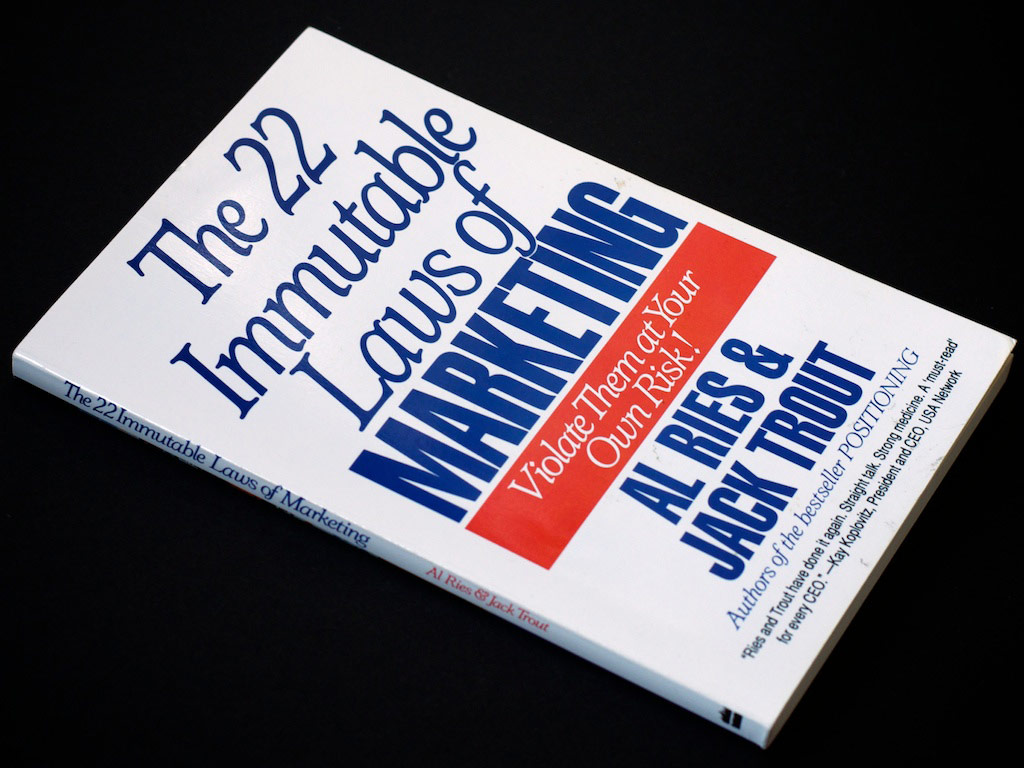I revisited the book The 22 Immutable Laws of Marketing, by Al Ries and Jack Trout (1994).
Below is a brief summary of the first 11 (I’ll post the second 11 soon!)
Law 1 (The Law of Leadership)
It’s better to be first than it is to be better.
The basic issue in marketing is creating a category you can be first in. It’s the law of leadership: It’s better to be first than it is to be better.
It’s much easier to get into the mind first than to try to convince someone you have a better product than the one that did get there first.
Law 2 (The Law of the Category)
If you can’t be first in a category, set up a new category you can be first in.
Everyone talks about why their brand is better. But prospects have an open mind when it comes to categories. Everyone is interested in what’s new. When you’re the first in a new category, promote the category.
Law 3 (The Law of the Mind)
It’s better to be first in the mind than it is to be first in the marketplace.
It’s better to be first in the prospect’s mind than first in the marketplace. Which, if anything, understates the importance of being first in the mind. Being first in the mind is everything in marketing. Being first in the marketplace is important only to the extent that it allows you to get in the mind first.
The law of the mind follows from the law of perception. If marketing is a battle of perception, not product, then the mind takes precedence over the marketplace.
Law 4 (The Law of Perception)
Marketing is a battle of perception, not product.
There are no best products. All that exists in the world of marketing are perceptions in the minds of the customer or prospect.
The perception is the reality. Everything else is an illusion.
Law 5 (The Law of Focus)
The most powerful concept in marketing is owning a word in the prospect’s mind.
A company can become incredibly successful if it can find a way to own a word in the mind of the prospect. Not a complicated word. Not an invented one. The simple words are best, words taken right out of the dictionary.
This is the law of focus. You “burn” your way into the mind by narrowing the focus to a single word or concept. It’s the ultimate marketing sacrifice.
Federal Express was able to put the word overnight into the minds of its prospects because it sacrificed its product line and focused on overnight package delivery only.
Law 6 (The Law of Exclusivity)
Two companies cannot own the same word in the prospect’s mind.
When a competitor owns a word or position in the prospect’s mind, it is futile to attempt to own the same word.
As we mentioned earlier, Volvo owns safety. Many other automobile companies, including MercedesBenz and General Motors, have tried to run marketing campaigns based on safety. Yet no one except Volvo has succeeded in getting into the prospect’s mind with a safety message.
Law 7 (The Law of the Ladder)
The strategy to use depends on which rung you occupy on the ladder.
In general, a mind accepts only new data that is consistent with its product ladder in that category. Everything else is ignored.
If you’re not number 1, admit to being lower on the ladder and explain why someone should instead work with you.
Law 8 (The Law of Duality)
In the long run, every market becomes a two-horse race.
Early on, a new category is a ladder of many rungs. Gradually, the ladder becomes a two-rung affair.
When you take the long view of marketing, you find the battle usually winds up as a titanic struggle between two major players—usually the old reliable brand and the upstart.
As time goes on, however, these customers get educated. They want the leading brand, based on the naive assumption that the leading brand must be better.
We repeat: The customer believes that marketing is a battle of products. It’s this kind of thinking that keeps the two brands on top: “They must be the best, they’re the leaders.”
Law 9 (The Law of the Opposite)
If you’re shooting for second place, your strategy is determined by the leader.
Much like a wrestler uses his opponent’s strength against him, a company should leverage the leader’s strength into a weakness.
If you want to establish a firm foothold on the second rung of the ladder, study the firm above you. Where is it strong? And how do you turn that strength into a weakness?
Law 10 (The Law of Division)
Over time, a category will divide and become two or more categories.
A category starts off as a single entity. Computers, for example. But over time, the category breaks up into other segments. Mainframes, minicomputers, workstations, personal computers, laptops, notebooks, pen computers.
Law 11 (The Law of Perspective)
Marketing effects take place over an extended period of time.
Many marketing moves exhibit the same phenomenon. The long-term effects are often the exact opposite of the short-term effects.

